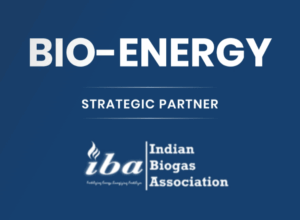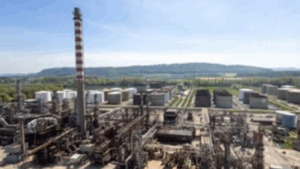Spotlight on Bio-Energy
By Abhijeet Mukherjee, Director operations,
Indian Biogas Association
POINT OF VIEW
 India’s bioenergy revolution is at a pivotal moment, buoyed by strong policy action and enthusiasm for green fuels. New pipeline infrastructure guidelines are dismantling key barriers to CBG market growth and accelerating scalable adoption across the country. The ambitious aim of the Government of India, with the latest endorsement by Hon. Minister Shri Nitin Gadkari calling farmers “Indhan Daata,” reflects a decisive move to empower farmers and lift rural economies. On the global front, skyrocketing sustainable aviation fuel production signals that policy-driven innovation truly powers sustainable, resilient progress.
India’s bioenergy revolution is at a pivotal moment, buoyed by strong policy action and enthusiasm for green fuels. New pipeline infrastructure guidelines are dismantling key barriers to CBG market growth and accelerating scalable adoption across the country. The ambitious aim of the Government of India, with the latest endorsement by Hon. Minister Shri Nitin Gadkari calling farmers “Indhan Daata,” reflects a decisive move to empower farmers and lift rural economies. On the global front, skyrocketing sustainable aviation fuel production signals that policy-driven innovation truly powers sustainable, resilient progress.
POLICY INITIATIVES AND INCENTIVES
 The latest MoPNG scheme supports pipeline infrastructure for Compressed Biogas (CBG), offering financial assistance up to ₹28.75 crore per project to connect CBG plants with city and transmission gas networks. The Indian Renewable Energy Development Agency (IREDA) signed a performance-based MoU with the Ministry of New and Renewable Energy (MNRE) on August 25, setting a bold target of ₹8,200 crore in revenue from operations for FY 2025–26. This follows its FY 2024–25 achievement of ₹6,743.32 crore, surpassing the earlier target of ₹5,957 crore. The MoU also specifies key financial performance metrics including return on net worth, capital employed, NPA ratios, asset turnover, and EBITDA fringes—reinforcing robust accountability and growth in renewable financing.
The latest MoPNG scheme supports pipeline infrastructure for Compressed Biogas (CBG), offering financial assistance up to ₹28.75 crore per project to connect CBG plants with city and transmission gas networks. The Indian Renewable Energy Development Agency (IREDA) signed a performance-based MoU with the Ministry of New and Renewable Energy (MNRE) on August 25, setting a bold target of ₹8,200 crore in revenue from operations for FY 2025–26. This follows its FY 2024–25 achievement of ₹6,743.32 crore, surpassing the earlier target of ₹5,957 crore. The MoU also specifies key financial performance metrics including return on net worth, capital employed, NPA ratios, asset turnover, and EBITDA fringes—reinforcing robust accountability and growth in renewable financing.
NEWS AND TRENDS
 Reliance Industries unveiled a bold vision at its August 29 AGM to establish 500 Compressed Biogas (CBG) plants across India by 2030, with 55 plants and 0.5 million tonnes capacity in the current year. Global bioenergy investment is on the rise, with the International Energy Agency projecting a 13% increase in 2025, reaching a record $16 billion. A new Iowa State University report explores how carbon payments could enhance the profitability of anaerobic digesters on U.S. swine farms by monetizing captured methane. In aviation, Air France’s Airbus A220 completed its delivery flight from Canada to Paris using sustainable aviation fuel (SAF)—the first time Airbus Canada issued official SAF credentials to a customer.
Reliance Industries unveiled a bold vision at its August 29 AGM to establish 500 Compressed Biogas (CBG) plants across India by 2030, with 55 plants and 0.5 million tonnes capacity in the current year. Global bioenergy investment is on the rise, with the International Energy Agency projecting a 13% increase in 2025, reaching a record $16 billion. A new Iowa State University report explores how carbon payments could enhance the profitability of anaerobic digesters on U.S. swine farms by monetizing captured methane. In aviation, Air France’s Airbus A220 completed its delivery flight from Canada to Paris using sustainable aviation fuel (SAF)—the first time Airbus Canada issued official SAF credentials to a customer.






